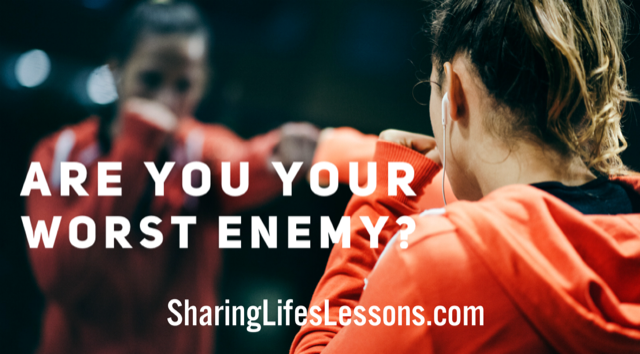
Are you your own worst enemy?
How are you? Most people when asked this question will politely answer, ‘I’m fine.’ However, what we’re seeing today is that many people aren’t fine and wish they had more hope. What brought this to mind was a painting that was mentioned in a talk by Pastor June Barrow.
The painting we’re referring to is called “Hope with Bandaged Eyes”. It was painted in 1886 by Georg Frederik Watts. Some historians believe it was painted to reflect Watt’s own feelings about the death of his adopted daughter’s baby. The painting shows a woman lying on a globe. Her eyes are bandaged. Maybe she’s trying to avoid seeing the sad state of life. Or maybe her eyes are bandaged because she has been crying and trying not to lose hope. She holds a harp with all strings broken except one. Her finger is stroking the one remaining string. We wondered if it means that she’s trying to hold on to the one string, with hope that she can get the ‘music of life’ going again.
Maybe you have times when you’ve felt like the person in the painting, like you’re hanging on to a little string of hope. The last few years have been difficult with the pandemic, lives lost and businesses folding. There’s conflict in the world, communities, and even in families. Deep divisions in politics, religion and healthcare can make it feel like there are enemies all around us. It can cause us to focus externally on others as the enemy, when in fact, we may lose hope by being are our own worst enemy.
In the 1960’s and 70’s there was a newspaper comic strip written by Walt Kelly called Pogo. In one of the strips, the character Pogo uttered the words, “We have met the enemy, and he is us.” That strip became a classic.
Also, recently, we watched a talk by Pastor Andy Stanley. In that talk he listed three behaviors we can put into our lives to give us hope and help keep us from becoming our own worst enemy.
- Pay attention to the tension. If we notice a tug on our conscience over whatever action we’re considering doing, he suggests to not try to push ourselves into doing it. Pay attention to the tension you feel, even if everybody else seems to think it’s okay. Sometimes the first bad decision can be the first step toward becoming your own worst enemy. When you think of the worst decision you’ve made in your life, was it preceded by a series of unwise decisions?
- Pay attention to your own narrative. Another way to identify the enemy within us is by identifying the stories we tell ourselves. These stories are often false narratives. Yes, we talk to ourselves all the time, either verbally out loud or with the thoughts that run repeatedly through our head. These stories are often built on negative things that have happened to us in the past.
These negative past experiences can be used to create excuses for why we aren’t happy now. Then we can use these stories to justify why we haven’t accomplished more in life. Unfortunately, negative experiences can turn into a narrative affecting how we view the world. Those narratives can negatively influence our decisions and they have the potential for us to lose hope and become our own worst enemy. - Pay attention to the voices of wisdom around you. Find wise people, who have nothing to gain or lose by telling you the truth, as they see it. Ask them, “What would you do if you were in my shoes?” Notice that you might already know what they would say. If you do already know, then you already know what to do. It’s so much easier for other people to see what you can’t see, because they’re not distracted by your internal narrative. Our ego may make it hard to ask for advice because we may worry about what others think of us. It’s helpful to get advice because our decisions also affect others. In addition, if we don’t ask for advice, we can miss out on gaining new knowledge.
What about you? Are there times when you lose hope and you become your own worst enemy? To keep that from happening, we encourage you to follow the suggestions listed – to notice the tension that may be going on in your body, the narratives you tell yourself, and get advice from voices of wisdom. Laird Hamilton has some wise advice when he said, “Make sure your worst enemy doesn’t live between your own ears.”
Chanhassen MN residents, Doug and Lynn Nodland are success coaches and owners of The Balance Center in Excelsior. Contact them at WeCare@SharingLifesLessons.com
© Doug and Lynn Nodland 2023 Articles and videos may be shared in their entirety with attribution.

Recent Comments